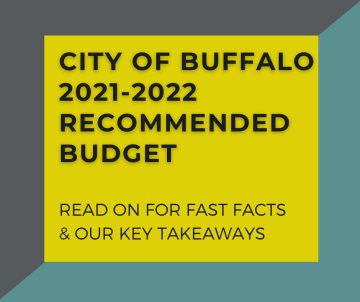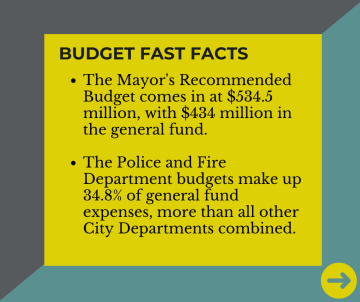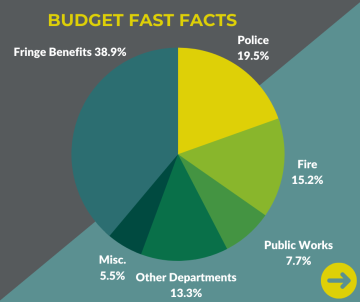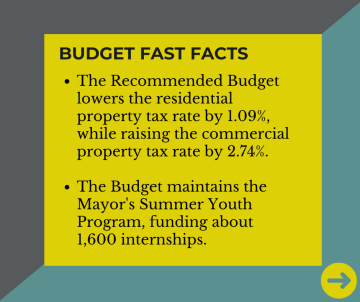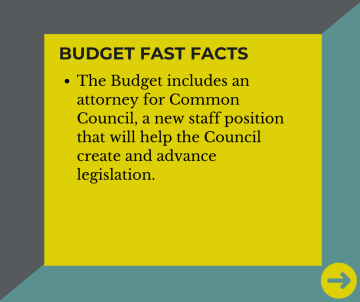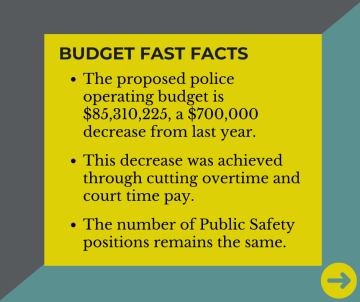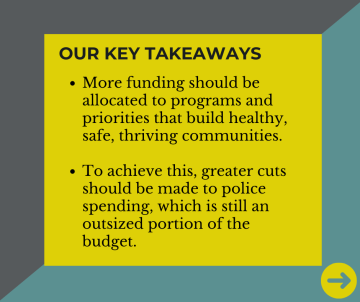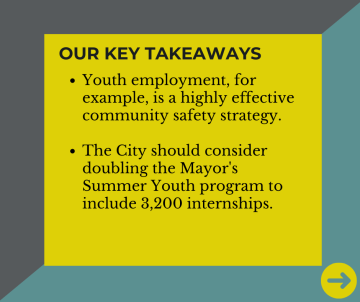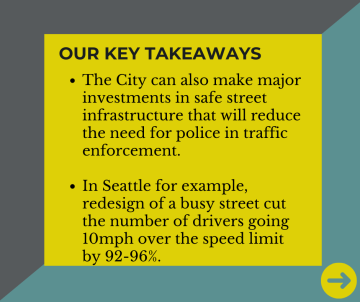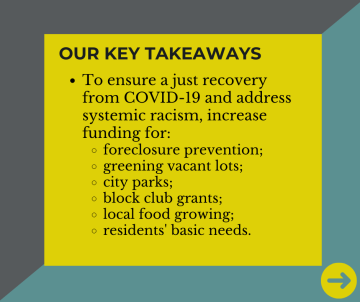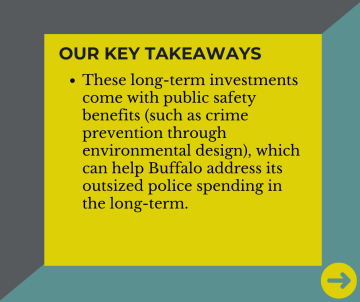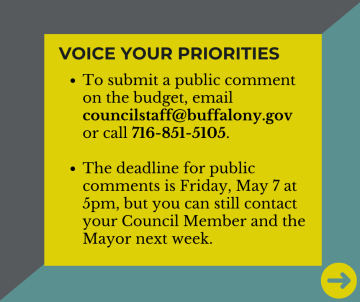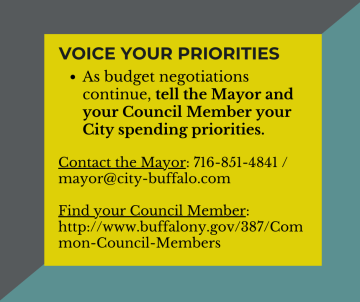News Take Action
Buffalo City Budget Public Comment Period Extended; Read PPG's Submitted Comment
| Date: | May 11, 2021 |
| Share: |
The Buffalo Common Council has extended the deadline to submit written public comments on the City Budget until Friday, May 14 at 5pm.
To comment on the budget, email councilstaff@buffalony.gov or call 716-851-5105.
Read on for PPG's submitted comments.
May 5, 2021
To: Buffalo Common Council
From: Partnership for the Public Good
Re: Fiscal Year 2021-2022 Recommended Budget
Dear Common Council members,
At Partnership for the Public Good, we work together with 315 community group and nonprofit partners, who work across the fields of youth services, housing support, environmental and green infrastructure projects, community health, and more. We reviewed the 2021-2022 Recommended Budget with the critical work and priorities of our partners in mind, and we offer the following suggestions for improvement:
1. Allocate more funding to priorities and programs that build healthy, safe, thriving communities.
- Youth employment, for example, is a highly effective community safety strategy. The City should consider doubling the Mayor's Summer Youth program to include 3,200 internships.
- Funding should be invested in using publicly-owned vacant land for public purpose, such as greening vacant lots, local food growing to address food insecurity, affordable housing development, and more. Funding should also be set aside for neighborhood planning processes to determine what happens with publicly-owned vacant land.
- Foreclosure prevention is critically important as we emerge from the COVID-19 pandemic; funding should be allocated to update the city's website technology to prevent foreclosures. Our partners have recommended that it should be possible to make partial payments online, display a user’s balance online, etc.
- The City can also make major investments in just streets infrastructure that will reduce the need for police in traffic enforcement. In Seattle, for example, redesign of a busy street cut the number of drivers going 10mph over the speed limit by 92-96%.
- Additional health and mental health services in the City of Buffalo are also critical, particularly in the area of drug user health. Low-level drug use is the top cause of misdemeanor arrests in the city, and an unproductive use of police time. As advocates remind us, “We can’t arrest our way out of addiction,” and a harm reduction approaches are long overdue. We are grateful that the proposed budget includes some funding toward training officers to begin Law Enforcement Assisted Diversion (LEAD) in Buffalo; this should be expanded alongside other alternatives to arrest.
Along with these priorities, to ensure a just recovery from COVID-19 and address systemic racism, funding should be increased for city parks and recreation, healthy housing rehabilitation and repair, block club grants, community-led safety and violence prevention efforts, and residents' basic needs.
These long-term investments come with public safety benefits (such as crime prevention through environmental design). Together, reallocating money to these programs can help Buffalo address its outsized police spending in the years to come.
2. Move more money from punitive policing to the above priorities that build safe and healthy communities.
Overall, the proposed police budget for 2021 is much the same as 2020. Last year's operating budget was $86 million, this year it's $85.3 million, with a cut of around $700,000. When fringe benefits and pensions are included, total city spending on police (current and retired) is closer to $145 million.
Before budget negotiations end, the City should explore six ways to further reduce the police budget, and reallocate the savings into community needs and priorities.
1) Refuse new increases in the police budget.
Potential savings: $1,130,000
This year, BPD proposed these increases, which should be refused:
- New vehicles is up $650,000 from $750k to $1.4 million.
- Clothing and Uniforms is up $117,000 from $484k to $601k.
- Furniture/equipment is up $363,000 from $345k to $708k.
2) Cut vacant positions from the budget.
Potential savings: $2.9 million +
The 2021-22 proposed budget funds 798 officer positions, but estimates only 735 will be filled in 2021. The City should cut 63 vacant positions, saving at least $2.9 million in salaries alone--even if all the positions were the lowest salaried rank. (This number includes 34 proposed new officers.)
3) Move civilian positions out of the police department.
Potential savings: $11 million
The proposed budget funds 186 civilian positions at an operating cost of $11 million, not including benefits. Vacant positions should be cut and Buffalo should follow the lead of Austin, Texas by moving duties like forensics, dispatch, and body camera oversight out of the police department. Savings can be set aside in a special fund while this transition is made throughout the year.
4) Reduce maintenance on unnecessary and excess equipment.
Potential savings: $300,000
Reduce the $407,000 spent maintaining equipment including assault weapons, aggressive crowd control devices, and excess gear. The City should request a list of all equipment, and compel BPD to sell or dispose excess items. (Police vehicle and building maintenance has separate funding of $1.3 million.)
5) Make bigger cuts to overtime and court time pay.
Potential savings: $1 million +
The proposed budget cuts overtime from $8 million to $7.5 million, and court time pay from $3.3 million to $2 million. Increase these cuts at least an additional $1 million. As LEAD and other alternatives to arrest are implemented, overtime and court time especially should decrease.
6) Cut unnecessary expenses.
Potential savings: $260,000 +
The police budget contains line items that other department budgets do not, such as $156,500 for "miscellaneous supplies" and $113,000 on "other services." These should be reviewed in itemized form and reduced dramatically.
Using these strategies, the City can cut an additional $16.5 million from the Buffalo Police Budget, bringing it down below $70 million. This would reduce the police operating budget by about 19.5%, instead of the current proposed cut (of under 1%).
To read about why more public funds should be invested in services and programs that improve public safety in safer, more equitable, and more cost-effective ways than policing, review our latest policy report, “Building a Safer Buffalo: Invest in Communities, Divest from Police.”
3. Change the way Buffalo does budgeting.
After the adoption of the 2021-2022 budget, Buffalo must change the way it does budgeting. We need radical changes that increase meaningful community engagement in the budget process, starting in January and going through May 31. Residents should not have to advocate for a budget public comment period to last longer than 24 hours, or for one or two public hearings.
The budget is an important document that dictates our priorities as a City and sets a roadmap for our future. Residents deserve to understand it, discuss it with their elected representatives, and share their concerns and priorities throughout the process.
